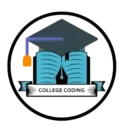C Language
- Home
- Courses
- C Language
Introduction to C language
The C language is a foundational programming language that has influenced many modern languages. It’s known for its efficiency and control over system resources, making it a preferred choice for system programming and embedded systems. A well-structured C language course module can provide learners with the essential skills needed to excel in the field of programming.
Duration - 2 Months

- Overview of the C programming language
- History and evolution of C
- Setting up the development environment (GCC, Visual Studio Code, Code::Blocks)
- Writing and running your first C program
- Syntax and structure
- Data types: int, float, char, double
- Variables and constants
- Basic input/output operations (printf, scanf)
- Comments and documentation
- Arithmetic operators
- Relational and logical operators
- Bitwise operators
- Assignment operators
- Conditional (ternary) operator
- Conditional statements (if, if-else, nested if)
- Switch-case statement
- Looping constructs (for, while, do-while)
- Break and continue statements
- Function declaration and definition
- Calling functions
- Function parameters and return values
- Recursion
- Local and global variables
- Static, extern, and register storage classes
- Scope and lifetime of variables
- Declaring and initializing arrays
- Accessing and modifying array elements
- Multidimensional arrays
- Declaring and initializing strings
- String handling functions (strlen, strcpy, strcat, strcmp)
- Character arrays
- Pointer basics and pointer arithmetic
- Pointers and arrays
- Pointers and strings
- Pointers to pointers
- Dynamic memory allocation (malloc, calloc, realloc, free)
- Pointers to functions
- Pointer arrays
- Defining and declaring structures
- Accessing structure members
- Array of structures
- Nested structures
- Defining and declaring unions
- Accessing union members
- Difference between structures and unions
- Defining and using enums
- Enum types and values
- Opening and closing files
- Reading from and writing to files
- File handling functions (fopen, fclose, fprintf, fscanf, fgets, fputs)
- Binary file operations
- Random access to files
- Error handling in file operations
- Macro definitions (#define)
- Conditional compilation (#ifdef, #ifndef, #endif)
- Include directives (#include)
- Macro functions
- Creating header files
- Using predefined macros
- Pragma directives
- Designing and implementing a C program
- Integrating various C programming concepts
- Testing and debugging the program
- Code review and presentation
